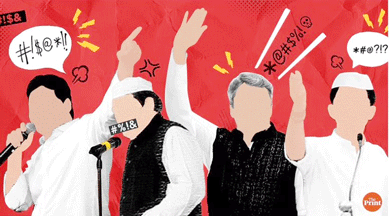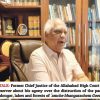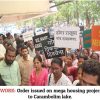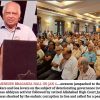Goa is abuzz with excitement as vintage bike and car owners, users, collectors and fans are decking […]

POLITICS HAS GOT CRIMINALISED! BY BIMAL JALAN
July 09 - July 15 2022 July 8, 2022CRIMINALISED: From manipulating politicians from behind the scenes, criminals have now got themselves elected to power and even joined the cabinet at the Centre and the State assemblies. In Goa for example, Mauvin Godinho who has been accused of power theft and which the Supreme Court has refused to allow the State government to withdraw. The main witness against him in the power theft case is former chief minister, Pratapsingh Raoji Rane.
By Bimal Jalan
Bimal Jalan in his latest book explains the process of how criminals have taken over politics in the country. Those who were willing to be king-makers have now become kings themselves. Over 50% of Members of Parliaments and 70% of Members of Legislative Assembly have criminal cases against them.
There have been some recent developments in the institutional framework, which have considerably reduced the effectiveness of India’s democratic system in serving the people. Democracy, like any other form of government, confers enormous powers on those who are elected or appointed to offices of the State. The great advantage of a democratic form of government, as compared with more authoritarian regimes, is the accountability of elected representatives to the people, particularly at the time of periodic elections. Unfortunately, in India, while elections are free and fair, they have not been able to get men of power to live ‘for’ the public rather than ‘off’ the public.
This was not always the case, and even today, there are several honourable exceptions among politicians who have given up their successful professional careers to serve the people. However, as a rule, there is a common and widely shared perception that politics is now a profession of choice for those who enjoy the benefits of power and the various immunities that it confers. All parties, old and new, nominate some persons with a history of criminal offences or other legal violations to contest elections. The governments in all states (with perhaps a couple of exceptions) have cabinets that include a fair number of such persons in charge of sensitive ministries. In recent years, this has been the case at the Centre too.
A common defence of this practice is that persons with criminal records have been elected ‘by the people’. Therefore, in a government ‘of the people’, they cannot be denied their just rewards. Interestingly and quite ironically, this argument does not apply to any other public servant or to members of any other profession. The special position accorded to criminals in political life has resulted in an interesting consequence: an increase in the ‘demand’ for entry into politics by those whose cases are pending in judicial courts at different levels.
The organizational structure of political power is ‘pyramidal’ in shape, as mentioned earlier. It is wide at the base or the grassroots, where the number of persons elected to political offices such as gram panchayats is large in number and entry is relatively free. However, the number of such offices shrinks drastically at the district, state or Union levels. The size of the electorate increases exponentially as one moves higher up the ladder, while the number of political constituencies and offices become fewer. The higher the level of an office, the pyramidal structure of political power increases the mismatch between supply and demand for that office and increases its scarcity value. This phenomenon partly explains why at higher political levels, entry into politics has become more restrictive. Access to politics at the higher levels (with some honourable exceptions) is now available only to persons with sufficient ‘clout’, in terms of family connections, money, ethnic and caste loyalty and/or coercive power. Competitive politics has also made electoral politics expensive, which has further reduced its accessibility to the average person who lacks adequate means, power and command over a community’s resources.
Another consequence of the high value attached to scarce political power is the emergence of leaders who enjoy a certain amount of ‘monopoly’ in the use of power. This explains the virtual disappearance of inner-party democracy from the Indian political scene.
Most parties, again with a few exceptions, have leaders who alone (or with the help of some trusted aides) decide who will fight elections, who will join the cabinet, and who will get nominated to various political and government offices. In case there is a threat to the power of a leader from another aspiring member of the same party, that member is likely to be expelled or declared persona non grata. Alternatively, if that aspiring member has adequate political strength and following, the original party is likely to be split. Parties may also be split from time to time for other reasons, such as joining a coalition in power or accepting the inducements offered by an aspirant with money or clout.
As a result, the number of parties vigorously contesting elections shows an increase over time, with most parties winning only a few seats. As one moves up the political pyramid, the ‘scope’ of power available to leaders also increases, further enhancing the scarcity value of power and demand for such offices at higher levels.
At the village level, the principal responsibilities entrusted to political representatives are relatively few. These include identification of beneficiaries under poverty alleviation and employment-generation schemes, among others. However, they have very little budgetary or financial powers to raise resources, and the bulk of fiscal resources for poverty-alleviation programmes are allocated by the central and state governments. Village-level panchayats also generally have no role in the delivery of education and healthcare services to residents. The operation of primary or secondary schools and public health centres continues to remain under the control of state government officials and their political masters.
The scope of powers available to political leaders increases enormously at the state and central levels. At the state level, in addition to a 100-plus centrally sponsored poverty alleviation and other schemes, there are a large number of infrastructure projects under management or construction. Another important source of financial power is the state cooperative and primary co-operative societies, which are fully or largely under the control of political representatives. In addition, there are numerous public-sector commercial or service organizations which have been set up by the state governments and are directly under the control of political leaders in administrative ministries.
State governments also have practically unlimited powers to establish new agencies and public-sector organizations, with separate budgets and separate management structures. At the Centre, of course, the entire governance machinery of the country is under the control and direction of political leaders. Thus, the predominant proportion of fiscal powers (including exclusive jurisdiction over custom tariffs and corporate taxation), the large public-sector undertakings in important sectors of the economy (such as banks, insurance, petroleum, food procurement and food distribution) and control over the allocation of national resources (including investment in crucial sectors, such as power, roads, aviation and ports) are under their control and direction. All matters relating to defence and external affairs, including defence procurement, are the exclusive preserve of the central government.
A development that has considerably increased the power of party leaders at the Centre, at the cost of state legislatures, is the amendment in the eligibility criteria of candidates for election to the Rajya Sabha (the so-called ‘Council of States’ at the Centre). Earlier, only people resident in a state were eligible for election by that state’s legislature to the Rajya Sabha. These elections were through a secret ballot, so that legislators could exercise their franchise freely.
Recently, the residence criterion as well as the provision of secret voting have been withdrawn through legislative amendments to the applicable rules. The central party leaders are empowered to nominate any person of their choice from anywhere in the country to represent a state in the Rajya Sabha. As the voting by legislators is open and subject to a whip, the legislators have practically no choice in choosing their representatives. In principle, the membership of the Rajya Sabha is now open to any person without any knowledge of the problems pertaining to or having any connection with the state that they are expected to represent in the Council of States. As the field is wide open and the number of seats is limited, after these amendments, the scarcity value of Rajya Sabha seats has also increased substantially. It is well known that politicians, as representatives of the people, enjoy a great deal of power in all spheres of public life. This, after all, is the essence of democracy.
The government is expected to work in the interest of the people, and it is their representatives who have to ensure that happens. Unfortunately, this proposition, which is entirely valid in theory, has become highly vitiated in practice, particularly in democracies where governments enjoy substantial power over the allocation of resources in the economy, including the savings of ordinary people and investments by the public and private sectors.
This excerpt from Bimal Jalan’s ‘From Dependence to Self-Reliance: Mapping India’s Rise as a Global Superpower’, has been published with permission from Rupa Publications.
Courtesy: The Print¬














